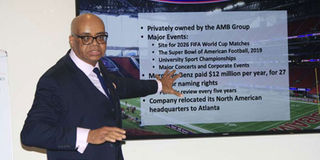Kenyan federations urged to change tack in sports marketing

Sports Consultant and Olympic scholar Idy Uyoe, from USA, makes a presentation during the opening of a National Olympic Committee of Kenya marketing workshop in Nairobi on January 28, 2020. PHOTO | CHRIS OMOLLO |
What you need to know:
- Olympic scholar tells Kenyan sports organisations to be more innovative
- Uyoe said that athletics is one of the country’s leading brand but its potential is yet to be realised fully.
There is need for the National Olympic Committee of Kenya (NOC-K) and its affiliates to shift away from traditional way of marketing their events in order to draw in sponsorship, a United States-based Olympic scholar and sports marketing specialist has said.
Idy Uyoe noted that Kenya, just like other emerging economies around the world, are over-dependent on government funding, yet these governments do not prioritise sport despite the fact that it’s a multi-million dollar business.
However, the Nigerian-born Uyoe hastened to add that things could gradually change if NOC-K and sports federations in the country are to change their deeply rooted culture on sponsorship and government funding.
MARKETING INITIATIVES
Uyoe, who was speaking on the sidelines of the ongoing workshop on “Sports Marketing for Olympic Organisations” in Nairobi, said the government should only improve the enablers like good infrastructure and atmosphere where sportsmen and women can thrive.
“Most governments in emerging economies doesn’t recognise the value sports hold, yet, in terms of business, it’s ranked up there like other financial, telecommunication, oil, gas or manufacturing sectors.
“The government shouldn’t lead in giving out funds, but enablers that will allow practitioners in private sector to take the lead on these marketing initiatives and sponsorship,” said Uyoe.
The Atlanta-based Uyoe said he doesn’t expect emerging markets and private companies to build or refurbish venues when it’s the governments that should do this.
“However, the government alone can’t manage this, hence the role of the private sector,” said Uyoe.
Uyoe regretted that most Olympic committees and their affiliates in emerging economies have misinterpreted sponsorship, a move that has locked out potential sponsors.
“When writing their proposals, most look at sponsorship as an advertisement or just a charity of donation without giving the company a reason to say yes.
“Rarely do they include what companies are bound to benefit,” said Uyoe, adding that every company has a responsibility to its shareholders to make profits and not merely give out sponsorship.
“But sports federation must make it attractive for private sectors to come in.
“A lot of time in Africa, we thing sponsorship is just going to ask for money,” said Uyoe, who is in the country to talk to NOC-K and its affiliates about coming up with a strategic marketing plan to drive their agenda.
DEVELOP ASSETS
Uyoe said that athletics is one of the country’s leading brand but its potential is yet to be realised fully.
“Kenya has no equal when it comes to athletics on the continent. But it’s about being able to develop assets around the success of Kenyan athletes.
“What I mean is that we need to come up with products and services that leverage the success that Kenya has had in athletics,” said Uyoe, adding that athletics is synonymous with Olympics and people find it hard alienating the two.
Uyoe said Athletics Kenya need to come up with a good marketing strategy to handle doping menace.
“I haven’t seen is a strong counter messaging strategy when these doping cases come up.
“They need to come up and state that while there is doping but it involves a small group of people,” explained Uyoe.
He observed that Kenya has dominated before and that the focus should be on clean athletes, who have represented the country with class, integrity and dignity.





